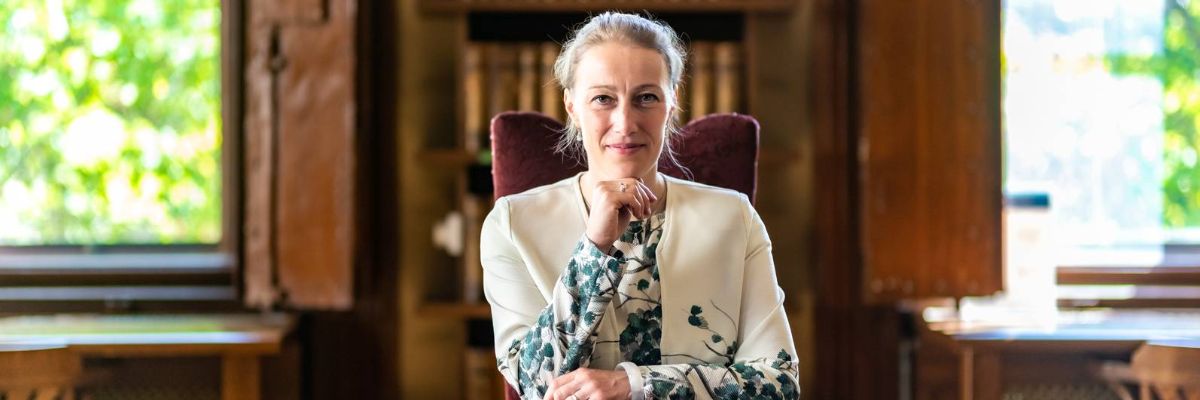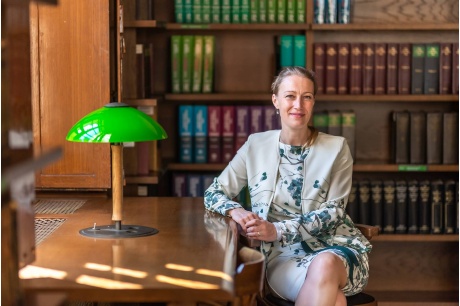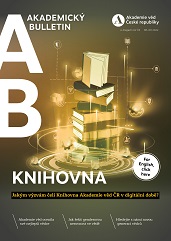
The Library of the Czech Academy of Sciences in the era of ones and zeros
17. 10. 2022
In modern society, it is almost impossible to steer clear of ones and zeros. Since the turn of the millennium, the world has gradually become dominated by modern technology, and we have no choice but to keep up. In an interview for the e-magazine of the CAS, AB / Academic bulletin, Magdaléna Vecková, Director of the Library of the Czech Academy of Sciences, reveals the goings-on of the Library in the digital age.
Floods, an explosion, across-the-board digitisation... Just a small selection of what the Library of the Czech Academy of Sciences (CAS) has faced over the last two decades. How does a traditional institution cope with the pitfalls posed by the digital age, nature, and chance? What stories are unfolding among its bookshelves? Since 2017, the Library has been led by Magdaléna Vecková, who guided us through its diverse pages.
How else can we start than by asking: what books did you read during the summer?
I started off with a bit of light reading, a Dick Francis detective story, after which a range of different genres awaited me. At the Library of the CAS, we recently finished collecting entries for the current (third) edition of our Ilustory literary contest, for which I serve as a juror. It has only one main condition and assignment: to write a short story based on a selected historical book illustration. Anyone can enter the contest, regardless of age or previous writing experience. We place no limits on imagination, either. We always receive a lot of stories, and they kept me company on holiday this year.
You have worked at the Academy since 2005, and specifically at its Library since 2011, which you have now headed for five years. We can’t help but ask about the devastating floods in August 2002 that also affected our headquarters. At that time, you were working at the Central Bohemian Regional Authority and coordinating the restoration of the areas damaged by the floods. What comes to mind, twenty years later?
The water, the despair of the people, the hopelessness – and it being a fitting instance of the school of life. I was only just starting out in terms of work, and I was able to help people and especially municipalities at least as the “guy in the chair”. To this day, I admire the dedication of the mayors who were in charge of the municipalities while working at their main job and at the same time dealing with their own problems caused by the floods.
How did the floods affect the Library’s collections?
Fortunately, our collections were not flooded by the water. Immediately after the flood, the Library cooperated with the affected CAS institutes and participated in the rescue of their collections – from the Institute of Archaeology on Malá Strana (Prague), its Archive on the banks of the Vltava River in Zámky, and the Institute of Philosophy in Jilská Street. For many days, my colleagues took turns driving to the affected areas and were literally rescuing and prying books and journals out of the mud. Among the affected holdings were also photographs, films, maps, slides, and collection artefacts. Some of the materials were irrevocably destroyed by the water.

Magdaléna Vecková, Director of the Library of the Czech Academy of Sciences.
What did you do with the damaged books that could be saved?
We built a drying station complete with a disinfection unit in the depository in Jenštejn. The rescued books and magazines, with the exception of rare prints, were temporarily frozen and then placed in a dryer for two weeks to dry out at the optimum temperature. We then disinfected them. Within one year, we were able to get the last of the rescued books back to their owners.
Speaking of a series of unfortunate anniversaries: next year it will be ten years since the gas explosion in Divadelní Street [the cross street from the CAS headquarters] which destroyed the Library premises... How did you cope with the aftermath?
We were already providing loan services from our cloakroom a week after the explosion, and for three weeks, we also created a temporary study room on the makeshift premises. In 21 days, we reopened the Reprography and Bookbinding Centre. At the beginning of June, all services were restored to their original premises. No one expected such a quick recovery shortly after the explosion. We even took advantage of the situation to refurbish the premises of the refreshment room, which now lives up to its purpose and is popular among library visitors.
Twenty years since the flood, ten since the explosion – that’s enough time to take stock. How far has the Library come in two decades?
The Library has always tried to keep up with trends at home and around the world and to anticipate and adapt services. It was one of the first to gradually change its cataloguing system from index cards to databases and to incorporate databases and e-books into its catalogue. In 2000, it gained access to Web of Science, a unique global database at the time. Digitisation was also rapidly gaining importance at the time of the floods. Therefore, a digitisation workplace was founded at the detached office in Jenštejn in 2003. Twenty years on, access to electronic information resources is now a given. In 2015, we were one of the first to launch online registration for remote access to electronic information resources. We are now preparing to implement BankID to make this service even more accessible.
For more on how the COVID-19 pandemic affected the Library's digital development and what projects the Library is now focusing on, read the full interview in the AB / Academic bulletin here.
Ing. Magdaléna Vecková
She has been working at the Library of the Czech Academy of Sciences since 2011. In 2013, she took on the position of Deputy Director and Head of the Administration and Economics Department. Since 2017, she has served as Director of the Library, and this year marks the beginning of her second term.
You can read the newest issue of the AB / Academic bulletin (in Czech) and the main story (in Czech and English) here:
08–9/2022 (version for browsing)
08–9/2022 (version for download)
Prepared by: Zuzana Dupalová, Luděk Svoboda, Division of External Relations, CAO of the CAS
Translated by: Tereza Novická, Division of External Relations, CAO of the CAS
Photo: Jana Plavec, Division of External Relations, CAO of the CAS
 The text and photos are released for use under the Creative Commons licence.
The text and photos are released for use under the Creative Commons licence.
Read also
- A trapped state: The pandemic impact on public attitudes, trust, and behavior
- Aerial archaeology: Tracing the footsteps of our ancestors from the sky
- Archaeologists uncover ancient finds along Prague Ring Road
- Our microbiome largely depends on what we eat, says microbiologist Michal Kraus
- The ABCs of writing: Why did its invention mark a turning point for humankind?
- We learn, remember, forget… What can memory actually do? And can we outsmart it?
- New Center for Electron Microscopy in Brno opens its doors to global science
- The hidden lives of waste: What can we learn from waste workers and pickers?
- A unique lab is hidden right beneath Prague’s Vítkov Hill
- Renewables are a strategic investment in European security, scientists say
The Czech Academy of Sciences (the CAS)
The mission of the CAS
The primary mission of the CAS is to conduct research in a broad spectrum of natural, technical and social sciences as well as humanities. This research aims to advance progress of scientific knowledge at the international level, considering, however, the specific needs of the Czech society and the national culture.
President of the CAS
Prof. Eva Zažímalová has started her second term of office in May 2021. She is a respected scientist, and a Professor of Plant Anatomy and Physiology.
She is also a part of GCSA of the EU.
